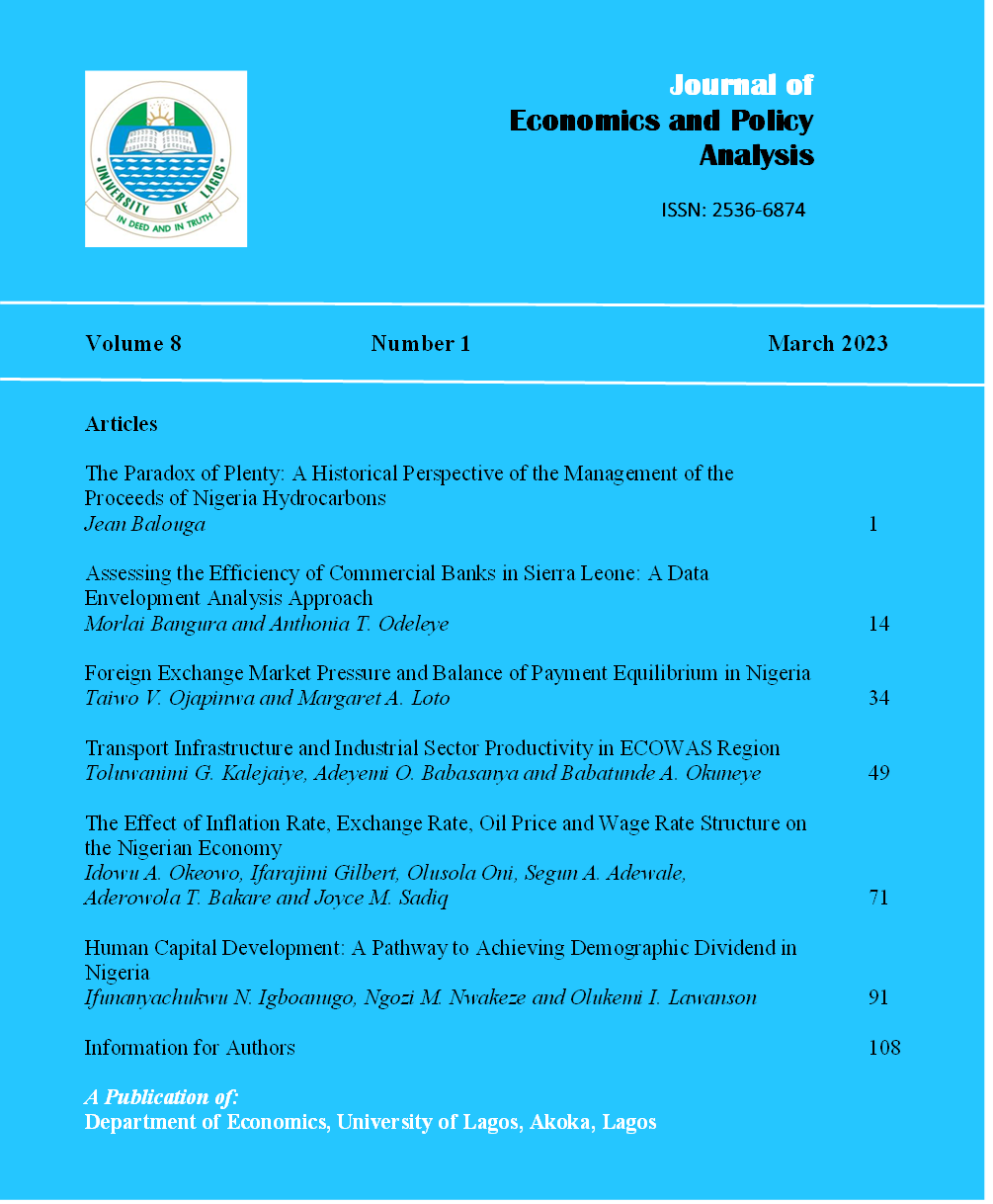The Paradox of Plenty: A Historical Perspective of the Management of the Proceeds of Nigeria Hydrocarbons
Abstract
In this research work an attempt was made to analyze the failure of the Nigerian government to save (and invest) a significant portion of the proceeds of Nigeria hydrocarbons over time. In the process, descriptive statistics, the Katona and institutional theories of saving, and the explanatory case study method were used. Our findings are that Nigeria had the ability to save but she chose to hurriedly invest in her economy instead, making mistakes in the process; and that her weak institutions might have contributed to this failure. Our recommendations are that Nigeria should embrace research-based planning, develop strong institutions, accelerate human capital development and cohesion, and learn from other resource-rich countries, the likes of Norway and Guyana, which avoided the natural resource trap phenomenon.
References
Akinmurele, L., & Oladeinde, D. (2020). Nigeria exposed on low buffers as oil may fall to $20, BusinessDay, 09 March; pp.1, 46.
Ani, M. (2020). Here’s what an S&P, Fitch, Moody’s negative outlook means for Nigeria, BusinessDay, 04 March; p. 34.
Anyaogu, I., & Oladeinde, D. (2020). Further strain on the economy as OPEC agrees 1.5m bpd cut, awaits Russian backing, BusinessDay, 06 March; p.4.
Ayado, S. (2020). Senate approves Buhari’s request to borrow $22.8bn, BusinessDay, 06 March; p.44.
Bello, O. (2020). Nigeria’s oil production could drop by 35% in 10 years – Wood Mackenzie, BusinessDay, 17 February; p.A2.
Bogunjoko, J.O. (2004). Growth performance in Nigeria: Empirical evidence in the 20th century, In G., Abdul-Ganiyu, F., Egwaikhide, & A. Adenikinju, (eds.). Leading Issues in Macroeconomic Management and Development, Nigerian Economic Society; chapter 6.
Businessday NG (2024). Top10 richest states in Nigeria ranked by GDP. https://businessday NG; accessed on 18/06/2024.
Essia, U. E. (2004). Industrialization and technological progress: Comparative developments in East Asia and Sub-Saharan Africa, In G., Abdul-Ganiyu, F., Egwaikhide, & A. Adenikinju, (eds.). Leading Issues in Macroeconomic Management and Development, Nigerian Economic Society; chapter 18
Etim, E. (2023). Umo Eno’s agenda and the multidimensional poverty in Akwa Ibom, BusinessDay, 02 August; p.11.
Iyoha, M.A. (2004). An overview of the leading issues in the structure and development of the Nigerian economy since 1960, In G., Abdul-Ganiyu, F., Egwaikhide, & A. Adenikinju, (eds.). Leading Issues in Macroeconomic Management and Development, Nigerian Economic Society; chapter 1.
John, I. (2020). Nigeria produced 12.5m barrels of oil below budget target in January, BusinessDay, 17 February; p. 40.
Kwen, J. (2020). Reps move to block $30bn annual revenue leakage from FX allocations by CBN, interbank, others, BusinessDay, 06 March; p.8.
Nigeria Multidimensional Poverty Index (2022). MPI_Web_Nov15_FINAL_2022%20(5)[45].pdf; downloaded on 27 June, 2024
Okafor, E. (2020). 5 takeaways from IMF’s 2020 outlook for Nigerian economy, BusinessDay, 19 February; pp. 1, 38.
Okoh, R.N. (2004). Resource sharing in Nigeria: A retrospective Evolution, In. G., Abdul-Ganiyu, F., Egwaikhide, & A. Adenikinju, (eds.). Leading Issues in Macroeconomic Management and Development, Nigerian Economic Society; chapter 5.
Oladeinde, D. (2019). Investors see green light in smaller African countries as oil investment dries up in Nigeria, BusinessDay, 18 December, 2019; pp.1, 39.
Oladeinde, D. (2020). Nigeria’s dilapidated infrastructure persists despite N83 trn oil revenue in 37 yrs, BusinessDay, 02 March; p.2.
Oladeinde, D., & Adams, S. (2020). Excess Crude Account slides to $70 m as fiscal buffers disappear, BusinessDay, 21 February; pp. 1, 35.
Omolola, S.A. (2004). Macroeconomic policies and long-run economic growth in Nigeria (1960-1998), In. G., Abdul-Ganiyu, F., Egwaikhide, & A. Adenikinju, (eds.). Leading Issues in Macroeconomic Management and Development, Nigerian Economic Society; chapter 20.
Parakova, T. (2020). Saudi Arabia strikes back at Russia in key oil market, oilprice.com/Energy/Crude Oil/Saudi-Arabia-strikes-Back-at-Russia-in-Key-Oil-Market.html; accessed on 04/07/24.
PWC (2024). https://taxsummaries.pwc.com>taxes-on-corps>; assessed on 16/07/2024
Sahara Reporters (2021). How Buhari Government Depleted Nigeria’s Excess Crude Account, http://saharareporters.com; accessed 16 June, 2024.
Smith, M. (2024). Guyana’s GDP Skyrockets by over 40% in a Single Year Thanks to Oil Boom, oilprice.com/Energy/Crude-oil/Guyanas-GDP-Skyrockets-by-over-40-%-in-a-Single-Year-Thanks-to-Oil-Boom, html; accessed on 27 June, 2024.
Todaro, M.P., & Smith, S.C. (2002). Economic development (8th ed.), Addison Wesley; Pearson Education Asia; pp. 71-72.
UNECE, (2015). The resource curse and policies to ameliorate it- UNECE, https://unece.org>DAM>ead>ptepf_ellmon; 26 May. Accessed on 13/07/2024


